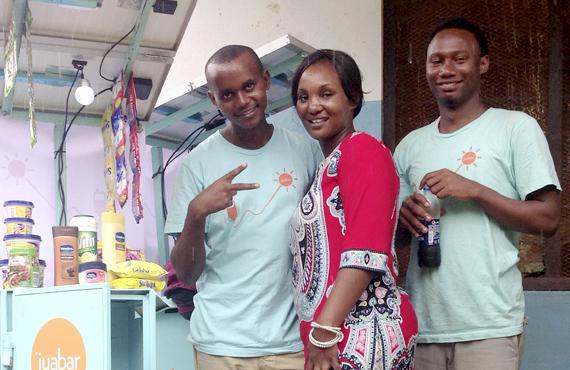Juabar is an innovative company that is expanding access to solar energy in the United Republic of Tanzania through providing solar powered kiosks to charge mobile phones. Daily Development speaks to Sachi Decou, a co-founder of Juabar, about its past and future.
DD: What does Juabar mean and how did your company first start in the United Republic of Tanzania—and why there?
SD: Juabar is a wordplay—‘Jua’ is sun in Swahili and ‘bar’ an English word for a space to gather and bring people together. The idea of our company started in early 2011, building on initial research that my business partner Olivia and others on our team conducted for another solar company. The team looked extensively at the energy experience in the United Republic of Tanzania and one of the insights we had was the growing need for electricity access and the uptake of mobile phone use. This combination gave birth to the idea of mobile phone charging kiosks in rural areas that convert the country’s abundant sunlight into electricity. With support from the California College of the Arts and the Appropriate Rural Technology Institute, we launched Juabar in the second half of 2013. Today, we have over 16 kiosks leased to individuals who operate the portable stations as small businesses in rural areas of the country.
Through Juabar we wanted to change peoples’ perceptions of solar technology as our research showed that there remained some lack of trust in solar technology in the Tanzanian market. Given the popularity of mobile phones and the need to charge them, our mobile charging kiosks provide an immediate benefit and a low entry barrier to solar technology.
DD: Why solar energy for the United Republic of Tanzania?
SD: Solar is very versatile, offering highly modular and clean energy. You can go from a single-watt lamp to a multi-megawatt grid tied solar installation. Because of its versatility, applicability to the dispersed population and environmental conditions of much of Africa, as well as the lowering price point, solar will become an important part of the energy ecosystem in Africa, offering diverse products and services. We are already seeing many innovations in the delivery of solar systems, such as lease-to-own solar panels or the option to simply source solar-generated electricity. Some governments offer incentives to encourage people to choose solar electricity, such as the lifting of value-added taxes and other forms of subsidies.
DD: What has been the response to Juabar?
SD: We are a small enterprise filling a niche. People recognize the need to charge their mobile phones as these devices have become extremely important in the country and across much of East Africa to both urban and rural dwellers alike. Mobile money transfer services have grown exponentially, providing banking services for the unbanked, who use their phones to send money across the country. Juabar provides a basic yet essential aspect—keeping devices charged in places where standard electricity is often unreliable or not readily available.
In terms of our entrepreneurs who lease the kiosks, what is exciting is that some of them have no previous experience in running a business whatsoever. Through Juabar they learn how to operate a small business, the challenges and the opportunities. We are also working with economic development organizations to support young people in acquiring entrepreneurial skills.
DD: Why do you think it is important to invest in solar energy?
SD: Solar will be a major factor in providing energy and electricity in the future. Battery technology will continue to advance to offer better efficiency and longer lasting batteries, and we will see more work being done to find better battery recycling options.
There are also more and more businesses investing in solar technology, and we are seeing a number of players emerging in the sector offering innovative services for solar-generated electricity. In East Africa, there are companies doing interesting work in terms of developing micro-grids and providing pay-as-you-go solar energy solutions. And the flexibility of solar energy means that services can be designed to fit local needs. For example, we are working on a new solar system that provides electricity to areas of cities that do not have grid connections because of rapid urbanization. In all, there is much to be excited about in this sector and it represents a dynamic, ever-changing space.
Contributor

Sachi Decou is a designer, researcher, creative agent and co-founder of Juabar. She has spent the last 10 years pursuing a career in design and community engagement in the United States of America, Mexico, Europe and now East Africa.


Post a comment